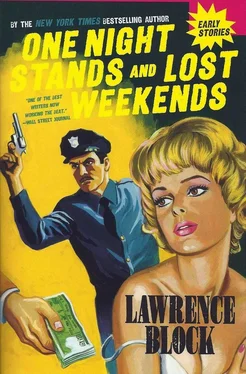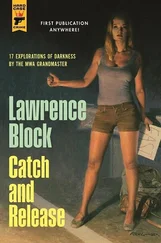Then I closed my eyes, gritted my teeth, and tried to think straight.
It wasn’t easy. So far I had managed one little trick — I had succeeded in convincing myself that Donahue had not killed the girl. But this wasn’t much cause for celebration. When you’re working for someone, it’s easy to get yourself to thinking that your client is on the side of the angels.
First of all, the girl. Karen Price. According to all and sundry, she was something of a tramp. According to her roommate she didn’t put a price tag on it — but she didn’t keep it under lock and key, either. She had wound up in bed with most of the heterosexual ad men on Madison Avenue. Donahue, a member of this clan, had been sleeping with her.
This didn’t mean she was in love with him, or carrying a flaming torch, or singing the blues, or issuing dire threats concerning his upcoming marriage. According to everyone who knew Karen, there was no reason for her to give a whoop in hell whether he got married, turned queer, became an astronaut, or joined the Foreign Legion.
But Donahue said he had received threatening calls from her. That left two possibilities. One: Donahue was lying. Two: Donahue was telling the truth.
If he was lying, why in hell had he hired me as a bodyguard? And if he had some other reason to want the girl dead, he wouldn’t need me along for fun and games. Hell, if he hadn’t gone through the business of hiring me, no one could have tagged him as the prime suspect in the shooting. He would just be another person at the bachelor dinner, another former playmate of Karen’s with no more motive to kill her than anyone else at the party.
I gave up the brainwork and concentrated on harmless if time-consuming games. I sat at my desk and drew up a list of the eight men who had been at the dinner. I listed the four married men, the Don Juan, the incipient divorcé and, just for the sake of completion, Lloyd and Kenneth. I worked on my silly little list for over an hour, creating mythical motives for each man.
It made an interesting mental exercise, although it didn’t seem to be of much value.
The Alhambra is a Syrian restaurant on West 27th Street, an Arabian oasis in a desert of Greek nightclubs. Off the beaten track, it doesn’t advertise, and the sign announcing its presence is almost invisible. You have to know the Alhambra is there in order to find it.
The owner and maitre d’ is a little man whom the customers call Kamil. His name is Louis, his parents brought him to America before his eyes were open, and one of his brothers is a full professor at Columbia, but he likes to put on an act. When I brought Ceil Gorski into the place around 8:30, he smiled hugely at me and bowed halfway to the floor.
“Salaam alekhim,” he said solemnly. “My pleasure, Mist’ London.”
“Alekhim salaam ,” I intoned, glancing over at Ceil while Louis showed us to a table.
Our waiter brought a bottle of very sweet white wine to go with the entrée.
“I was bitchy before. I’m sorry about it.”
“Forget it.”
“Ed—”
I looked at her. She was worth looking at in a pale green dress which she filled to perfection.
“You want to ask me some questions,” she said, “don’t you?”
“Well—”
“I don’t mind, Ed.”
I gave her a brief run-down on the way things seemed to shape up at that point.
“Let me try some names on you,” I suggested. “Maybe you can tell me whether Karen mentioned them.”
“You can try.”
I ran through the eight jokers who had been at the stag. A few sounded vaguely familiar to her, but one of them, Ray Powell, turned out to be someone Ceil knew personally.
“A chaser,” she said. “A very plush East Side apartment and an appetite for women that never lets up. He used to see Karen now and then, but there couldn’t have been anything serious.”
“You know him — very well?”
“Yes.” She colored suddenly. She was not the sort you expected to blush. “If you mean intimately, no. He asked often enough. I wasn’t interested.” She lowered her eyes. “I don’t sleep around that much,” she said. “Karen — well, she came to New York with stars in her eyes, and when the stars dimmed and died, she went a little crazy, I suppose. I wasn’t that ambitious and didn’t fall as hard. I have some fairly far-out ways of earning a living, Ed, but most nights I sleep alone.”
She was one hell of a girl. She was hard and soft, a cynic and a romantic at the same time. She hadn’t gone to college, hadn’t finished high school, but somewhere along the way she had acquired a veneer of sophistication that reflected more concrete knowledge than a diploma.
“Poor, Karen,” she said. “Poor Karen.”
I didn’t say anything. She sat somberly for a moment, then tossed her head so that her bleached blond mane rippled like a wheat field in the wind. “I’m getting morbid as hell,” she said. “You’d better take me home, Ed.”
We climbed three flights of stairs. I stood next to her while she rummaged through her purse. She came up with a key and turned to face me before opening the door. “Ed,” she said softly, “if I asked you, would you just come in for a few drinks? Could it be that much of an invitation and no more?”
“Yes.”
“I hate to sound like—”
“I understand.”
We went inside. She turned on lamps in the living room and we sat on the couch.
She started talking about the modeling session she’d gone through that afternoon. “The money was good,” she said, “but I had to work for it. He took three or four rolls of film. Slightly advanced cheese-cake, Ed. Nudes, underwear stuff. He’ll print the best pictures and they’ll wind up for sale in the dirty little stores on 42nd Street.”
“With the face retouched?”
She laughed. “He won’t bother. Nobody’s going to look at the face, Ed.”
“I would.”
“Would you?”
“Yes.”
“And not the body?”
“That too.”
She looked at me for a long moment. There was something electric in the air. I could feel the sweet animal heat of her. She was right next to me. I could reach out and touch her, could take her in my arms and press her close. The bedroom wasn’t far away. And she would be good, very good.
Two drinks later, I got up and walked to the door. She followed me. I stopped at the doorway, started to say something, changed my mind. We said good night and I started down the stairs.
If she had been just any girl — actress, secretary, college girl, or waitress — then it would have ended differently. It would have ended in her bedroom, in warmth and hunger and fury. But she was not just any girl. She was a halfway tramp, a little tarnished, a little soiled, a little battered around the edges. And so I could not make that pass at her, could not maneuver from couch to bed.
I didn’t want to go back to my apartment. It would be lonely there. I drove to a Third Avenue bar where they pour good drinks.
Somewhere between two and three I left the bar and looked around for the Chevy. By the time I found it I decided to leave it there and take a cab. I had had too little sleep the night before and too much to drink this night, and things were beginning to go a little out of focus. The way I felt, they looked better that way. But I didn’t much feel like bouncing the car off a telephone pole or gunning down some equally stoned pedestrian. I flagged a cab and left the driving to him.
He had to tell me three times that we were in front of my building before it got through to me. I shook myself awake, paid him, and wended my way into the brownstone and up a flight of stairs.
Then I blinked a few times.
Читать дальше












